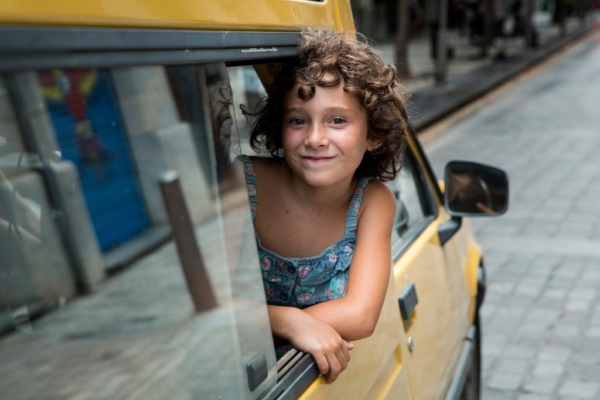![]() This richly observed, emotionally resonant drama is told from the perspective of Frida (Laia Artigas), a six-year-old girl who just lost her mother. From the beginning, a sense of confusion hangs over everything, with Frida numbly playing outside while the adults pack up all of her belongings. She is subsequently moved from Barcelona to the Catalan countryside to live with her uncle and aunt, without knowing exactly what happened to her mother. We are in the same boat. At one point, Frida’s aunt, Marga (Bruna Cusí), is talking to another woman when Frida’s mother’s name comes up. When Marga says she died of pneumonia, the other replies, “I thought it was something else.”
This richly observed, emotionally resonant drama is told from the perspective of Frida (Laia Artigas), a six-year-old girl who just lost her mother. From the beginning, a sense of confusion hangs over everything, with Frida numbly playing outside while the adults pack up all of her belongings. She is subsequently moved from Barcelona to the Catalan countryside to live with her uncle and aunt, without knowing exactly what happened to her mother. We are in the same boat. At one point, Frida’s aunt, Marga (Bruna Cusí), is talking to another woman when Frida’s mother’s name comes up. When Marga says she died of pneumonia, the other replies, “I thought it was something else.”
Frida undergoes a summer of extreme adjustment, moving from the city, where she had a large extensive family nearby, to a mostly remote location, where we get the impression she was probably spoiled in her old life. Here on the farm, Marga expects the girl to do chores, and she cannot eat just cookies for breakfast, or at least not without drinking her milk first. The tension between them is evident from the start, as it is between Frida and her new younger sister, Anna (Paula Robles), the daughter of her uncle Esteve (David Verdaguer). The younger girl immediately looks up to Frida, but in one of their first scenes together, the newcomer slowly unpacks all of her dolls but then tells Anna she’s not allowed to play with any of them.
These early scenes, which Carla Simón directed from a screenplay based on her childhood memories, largely center on the emotional barriers that Frida sets up between herself and her new immediate family. They eventually start to come down, although the process is not always predictable or neat. Marga seems in a hurry to integrate Frida into their pre-existing unit, and she constantly worries about the girl’s tendency towards indulgence, especially when Anna starts to imitate it. But there’s also Frida’s wholly understandable longing for the life she left behind. Here she’s being asked to accept a new maternal figure while her other one is still fresh in her memory.
There are no bad people in this situation; everyone is doing the best they can in the face of the most tragic of circumstances. The question is, whether they can weather the hard times without contributing to another tragedy, and the most suspenseful moments are those that come close to crossing that line: Frida, exasperated by Anna’s constant following at her heels, engages her in a game of hide-and-seek and then abandons her. Later, when she goes back for Anna and cannot find her, she starts to wander the woods, gradually becoming more aware of the potential dangers there.
Simón, making her feature directorial debut, has an assured style in which she rarely reveals anything explicitly, opting instead to allow our imaginations to fill in the details. There are hints as to what Frida’s mother was like: Frida and Anna role-play being a married couple, and the former lies around in sunglasses and make-up, smoking a pretend cigarette. Frida may also have some kind of health issue by how overprotective Marga and Esteve are with her at times, including rushing her off to a doctor when she skins her knee on a playground. Actually, Marga first rushes her to a washroom to clean her wound, making sure to put latex gloves on before she touches it.
The director often positions the camera just behind Frida’s shoulder as it follows her around, giving the impression we are seeing the world through the young girl’s eyes. Coupled with a minimalist soundtrack, the resulting view of farm life is highly unsentimental, downright ugly at times, and devoid of nostalgia—when she first visits a chicken coup, there’s the disturbing image of chickens devouring the yolks from broken eggs. But there are also moments of fascination that seem genuine: a local festival in which other children parade around wearing giant puppet heads.
The actors are uniformly wonderful, especially Artigas as Frida, whose performance lacks self-consciousness, which meshes well with the overall realistic tone. Another standout is Cusí as the sympathetic Marga, who also represents the outsider amongst her husband’s family. The extent of that becomes more apparent as she finds herself increasingly having to battle the others’ tendencies to spoil Frida. Due to her more detached perspective, Marga also recognizes something no one else does: Frida’s best way forward is to become acclimated to her new life as quickly as possible, not to dwell on the past.
There are questions that continue hanging over the film, all of which Simón eventually answers, including why the film has its title; in truth, it couldn’t have been any other year. But at the same time, Summer 1993 never feels like a period piece. Its depiction of Frida as being at the mercy of powerful emotions she cannot yet comprehend, and how childhood itself is often bittersweet, is universal and timeless. This is one of the best films of the year so far.

















Leave A Comment